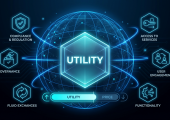Real estate tokenisation is transforming a global market estimated at almost CHF 302,000 billion into opportunities accessible to all. This concept enables the ownership of a property to be broken down into several digital assets (tokens) and offered for sale on the market. Today, even with less than fifty euros, you can become the owner of a fraction of a property.
In this practical guide, we explore the tokenisation of real estate from every angle. This financial innovation offers a number of notable advantages: it makes it quick and easy to exchange the rights attached to a property, creates a more liquid market where you can find a buyer in just a few hours or days, and does away with lengthy contractual processes through the use of smart contracts. Already, 3% of the world's foreign exchange transactions take place in the form of tokenised assets, illustrating the growth of this new investment approach.
Understanding property tokenisation
What is the property tokenisation exactly? Let's explore this concept, which is revolutionising property investment.
A simple definition of tokenisation
Real estate tokenisation involves dividing a property into several digital assets called tokens, each representing a fraction of the property. These tokens can then be bought, sold or traded on specialist platforms. For example a building worth one million euros can be split into one million tokens, each worth one euro. This process democratises access to property investment, traditionally reserved for investors with substantial capital.
The process generally begins with a valuation of the property, followed by its division into equal shares represented by tokens. These tokens are then registered on a blockchain and put up for sale, allowing investors to easily acquire fractions of the property.
Difference between tokenisation and shares
Although similar in principle to shares in an SCI (Société Civile Immobilière) or a property investment fund, tokenisation has some notable differences:
- Real estate tokens are created and registered on a blockchainunlike traditional shares
- Like company shares, tokens generally confer a right to profits (rents, capital gains).
- However, tokens can sometimes offer fewer rights than shares, particularly in terms of governance and management of the asset.
- Token liquidity is generally higher, making transactions faster and simpler
Why blockchain is essential
The blockchain is the technological foundation of real estate tokenisation. It is a decentralised register that enables information to be stored and transmitted in the form of unforgeable blocks. Unlike traditional centralised registers such as land registers, blockchain is not controlled by a single authority.
Each change in the blockchain results in the creation of new blocks, ensuring that the information is always up to date and accurate. In addition, the decentralised nature of the blockchain means that each member of the network contributes to the reliability of the information, making the system virtually tamper-proof.
This technology guarantees the transparency of transactions and makes it easy to track the ownership and value of assets. In addition, blockchain makes it possible to automate certain processes using smart contracts, considerably reducing operational costs and lead times.
Our subsidiary by Ravel Estate offers tokenised property investments, enabling our customers to benefit from all these advantages with professional support.
How does property tokenisation work?
The process of property tokenisation takes place in several key stages that transform a physical asset into digital tokens. Here's how the mechanism works in practice.
Creating tokens
Firstly, the creation of tokens requires a precise valuation of the property by experts. Once the value has been established, the issuer determines the number of tokens to be created and their unit price. For example, for a building valued at 10 million eurosWe could create 10,000 tokens at €1,000 each.
Next, you need to choose the appropriate type of token. The most common are security tokens (which represent a financial security) and utility tokens (which give access to services linked to the asset). This stage also includes drafting a whitepaper detailing the project and the rights associated with the tokens.
Use of smart contracts
Smart contracts are computer programmes that run automatically when certain conditions are met. In the context of tokenisation, they make it possible..:
- Automate the distribution of rental income to token holders
- Manage property transfers without intermediaries
- Ensure the transparency of transactions
- Reduce traditional administrative costs
These smart contracts also define the governance rules for the tokenised asset, such as voting conditions for important decisions concerning the asset.
Registration on the blockchain
Registration on the blockchain is the step that secures the entire process. Information relating to the property and tokens is immutably recorded in encrypted blocks. This step guarantees:
- The authenticity of the property
- Transaction history cannot be modified
- Full traceability of exchanges
- Reducing the risk of fraud
Example of a complete process
Let's take the example of an office building. Valued at €5 million, the issuer creates 5,000 tokens at €1,000 each. Smart contracts are programmed to automatically distribute 90% quarterly rental income to the holders. The tokens are registered on a blockchain such as Ethereum and offered to investors via a specialised platform. Buyers can acquire fractions of a building according to their budget, receive their share of the rent and easily resell their tokens on a secondary market.
At by Ravel EstateWe support our customers every step of the way, enabling them to invest in tokenised real estate in complete security.
Practical benefits of property tokenisation
The advantages of tokenised property are numerous and tangible for investors from all walks of life. Here's why this innovation is attracting more and more enthusiasts.
Accessibility for small investors
La property tokenisation is revolutionising access to the property market. Whereas traditional investment requires large amounts of capital, tokenised real estate makes it possible to get started. with just €50. This democratisation opens up the market to investors with limited resources. In addition, this system is similar to SCPIs, but with the added advantage of blockchain technology.
Reduce costs and delays
No more lengthy notary procedures and high commissions. Buying property tokens is as easy as a few clicks, with a sale effective upon registration of the transaction on the blockchain. This automation via smart contracts eliminates traditional intermediaries and considerably reduces administrative costs.
Increased liquidity of assets
Unlike traditional real estate, tokenised real estate offers remarkable liquidity. If you want to sell at the market price, you can usually find a buyer in just a few hours or days. Some platforms, such as RealT, already offer efficient secondary markets for the resale of tokens.
Security and transparency of transactions
Thanks to the blockchain, all transactions are recorded immutably. This means you can easily find out the complete history of a token or property: number of exchanges, number of holders, initial and current price. This transparency reinforces trust and considerably reduces the risk of fraud.
Geographic diversification made easy
Tokenisation makes it easy to invest in different countries without complex paperwork or currency conversions. Platforms like RealT offer property in the US and Panama, with plans to expand into Europe. This geographical diversification helps to spread risk, as different regions often experience different economic cycles.
To support you in this new form of investment, our subsidiary by Ravel Estate offers carefully selected tokenised property projects. Contact us to find out how you can incorporate this innovation into your asset management strategy.
Regulations and outlook for 2025
In France, the regulatory landscape surrounding property tokenisation is evolving rapidly to provide a framework for this financial innovation.
Current legal framework in France
The 2019 PACTE Act forms the basis of the French regulatory framework for digital assets. Nevertheless, it does not specifically address tokens representing real estate assets, creating a legal grey area that sometimes hinders the development of the sector. The Order of 8 December 2017 recognised blockchain as a registration infrastructure for financial securities, the first step towards recognising real estate tokens. The Autorité des Marchés Financiers (AMF) plays a central role in supervising platforms offering these services, which must be authorised to guarantee investor security.
Types of tokens and legal implications
The legal status of tokens determines the applicable regulatory obligations. The main distinctions are as follows:
- The security tokensThese are considered to be financial securities and are subject to strict regulations requiring an STO (Security Token Offering).
- The utility tokenswhich are generally less regulated and can be issued via an ICO (Initial Coin Offering).
This distinction has major implications for disclosure requirements, taxation and investor protection.
Expected market trends
Between now and 2025, the legal framework is set to expand considerably. The European MiCA regulation will come fully into force in 2024, providing an initial clarification. In addition, a proposal for a European directive specific to tokens backed by real assets is currently under discussion. In France, legislative initiatives aimed at creating a specific status for "communities of token holders" are being prepared for 2024.
Why work with a professional
The complexity of the regulations makes expert advice essential. A specialist lawyer can help you to:
- Ensuring that your project complies with legal requirements
- Drafting smart contracts
- Anticipating and managing the legal risks associated with your investment
To help you with your property tokenisationour subsidiary by Ravel Estate offers tokenised property investments that comply with current regulations, allowing you to invest in this innovative asset class with complete peace of mind.
Conclusion
Real estate tokenisation undoubtedly represents a major revolution in the investment sector. This technology is radically transforming the way we acquire and manage property. The advantages are many: accessibility from as little as a few dozen euros, increased liquidity of assets, a considerable reduction in fees and delays, total transparency of transactions and easier geographical diversification.
Certainly, some regulatory challenges remain, particularly in France where the legal framework is still evolving. Nevertheless, between now and 2025, we will certainly see a gradual clarification of the rules governing this financial innovation, thanks in particular to the European MiCA regulation and French legislative initiatives.
Blockchain is the cornerstone of this transformation, offering unrivalled security and transparency. Every transaction can be forged and traced, while smart contracts effectively automate traditionally cumbersome administrative processes.
For beginner investors, tokenised real estate now opens doors that were previously closed. You can start small and gradually increase your exposure to this promising asset class. However, as with any investment, professional guidance is invaluable in navigating this new ecosystem.
Our Ravel Estate subsidiary offers just such expertise, combining in-depth knowledge of the property market with mastery of blockchain technologies. We rigorously select each tokenised project to offer our customers secure, high-performance investment opportunities. In this way, you benefit fully from the advantages of tokenisation while minimising the risks inherent in this new approach.
Tokenisation is not just a passing trend, but the future of property investment. The first to take an interest today will certainly be at an advantage tomorrow, as this technology becomes more widely available.
FAQs
Q1. What is real estate tokenisation and how does it work? Real estate tokenisation involves dividing a property into digital tokens representing fractions of ownership. These tokens are created, registered on a blockchain and can be bought, sold or exchanged on specialised platforms.
Q2. What are the main advantages of investing in tokenised real estate? The benefits include greater accessibility for small investors, improved asset liquidity, lower fees, faster transactions, greater transparency and the ability to diversify portfolios geographically more easily.
Q3. How does the blockchain guarantee the security of tokenised real estate transactions? Blockchain ensures the authenticity and immutability of transactions by recording them in encrypted, decentralised form. This enables complete traceability, reduces the risk of fraud and guarantees transparency of ownership history.
Q4. What is the current regulatory framework for real estate tokenisation in France? The regulatory framework is evolving rapidly. The 2019 PACTE Act lays the foundations, but does not specifically address real estate tokens. The AMF supervises platforms, and developments are expected with the European MiCA regulation and new French legislative initiatives.
Q5. Why is it advisable to be accompanied by a professional when investing in tokenised real estate? Professional support is recommended because of the complexity of the regulatory framework and the specific technical features of tokenisation. An expert can help to ensure legal compliance, manage risks and optimise investment in this new and rapidly evolving field.





